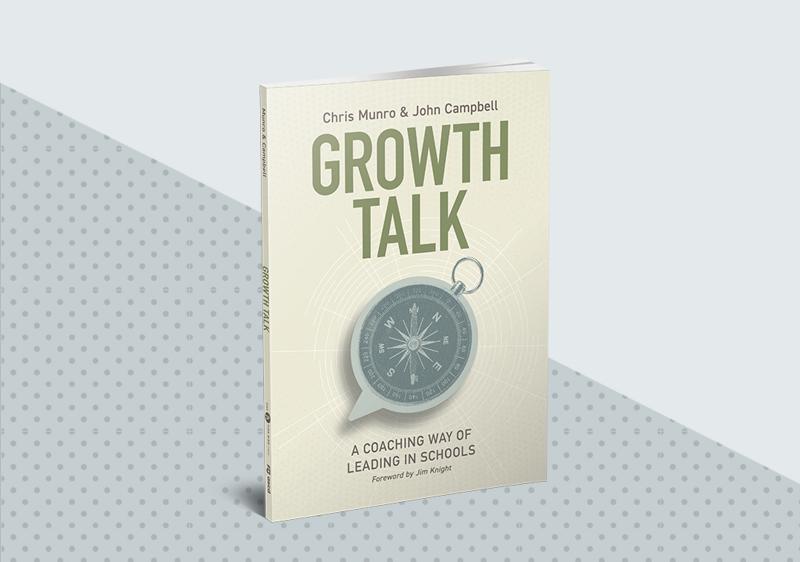What does it take to lead a truly growth-oriented conversation? In Growth Talk: A Coaching Way of Leading in Schools (ASCD, 2025), authors Chris Munro and John Campbell explore how school leaders can use everyday conversations with teachers to foster learning, reflection, and professional trust.
This excerpt focuses on what they call a “coaching way of being”—the beliefs, attitudes, and behaviors that shape how a leader shows up in conversation and how they’re perceived by those they’re coaching. Drawing on key concepts from coaches Christian van Nieuwerburgh and Jim Knight, Munro and Campbell show how five essential qualities—humility and respect, belief in others, integrity, cultural capability, and confidence—help leaders create the conditions for genuine professional growth.
Humility and Respect
We demonstrate humility by setting aside our expertise, knowledge, and perspective until it is absolutely needed. It may seem paradoxical, but we bring expertise without showing up as the expert. We are respectfully curious and aim to keep our conversation partner in the driver’s seat by seeking to privilege and amplify their voice and choice in the conversation.
In an influential book, Humble Inquiry: The Gentle Art of Asking Instead of Telling, organizational psychologist Edgar Schein introduced the concept of here-and-now humility:
Here-and-now humility is how you feel when you realize that you are dependent on someone else in the situation. Your status is inferior to the other person at that moment because he or she knows something or can do something that you need in order to accomplish your task or goal. (p. 22)
While Schein initially focused on hierarchical relationships in which leaders depend upon subordinates for their expertise and skills, which, in turn, enable the leaders to realize their own (or an organization’s) goals, we find the concept of dependency applicable to the broader context of conversation leaders and partners. Regardless of your (and your partner’s) hierarchical positions, when you lead with humility, you place yourself in a position of dependency, at least in the context of the conversation. Your conversation partner is invariably the expert on their own perceived reality.
Schein links this form of humility to curiosity:
My here-and-now humility can by itself trigger a very positive and genuine curiosity and interest in you. You will feel acknowledged, and it is precisely my temporary “subordination” that can create psychological safety for you. (p. 26)
Educators may find it challenging to assume this “subordinate” role in a learning conversation, even knowing full well that the arrangement is temporary by design. Teachers are accustomed to a power dynamic in which their students depend on them as their teacher and as the “adult in the room.” We can get beyond our initial discomfort with handing over the wheel when we remind ourselves that our purpose in doing so is to support our partner’s thinking and help them achieve a more positive future for themselves and, ultimately, their students.
In much the same way, the conversation leader listens attentively to understand and, more important, to help their conversation partner understand. We do so by noticing and suspending our judgments, assumptions, and conclusions even if we think we are certain we have the answer. In doing so, we give our partner the opportunity to think aloud and reach their own conclusions. But when we conclude that shifting to a dialogical stance is appropriate (ideally, when our partner signals that they are ready for it), we exhibit humility by offering our perspective and suggestions in an emotionally intelligent and respectful manner. We use tentative language to test our assumption that our partner is ready for more input from us, and we actively build on what they contribute.
Belief in Others, Care, and Empathy
As conversation leaders, we need to have faith in our conversation partner’s capacity to learn, grow, and realize their goals. For a teacher, this belief is akin to having a growth mindset and holding high expectations for our students. When we believe in our conversation partner’s potential for growth and success, we are less likely to default to a directive stance. A facilitative or dialogical stance, therefore, evokes more genuine engagement and thinking. Conversely, if our expectations are low, we are more likely to cut to the chase by offering unsolicited advice or asking leading questions. Moreover, such “advice” is often suspect because it is informed by our own beliefs, biases, and experiences.
As conversation leaders, we need to have faith in our conversation partner’s capacity to learn, grow, and realize their goals.
We show empathy by taking the time to listen without judgment and seeking to clarify how they experience their current reality. We also listen beneath the surface by noticing and naming underlying emotions that may not always be evident in their words but show up in their body language, tone of voice, or other nonverbal forms of expression. An expression of empathy is like an emotional paraphrase. That is, when we name the emotion accurately, our partner feels seen, and we build a stronger connection with them. If we get it slightly wrong, our partner will correct us and name the emotion themselves.
Integrity
When conversation leaders display integrity, they build trust in their partners. We demonstrate integrity in a number of ways, beginning with listening attentively. Discretion is another component of integrity; for example, we explicitly discuss our commitment to keeping the conversation confidential, but we are also upfront about possible exceptions to this rule. Reliability also builds trust. We show this by consistently delivering on any promises we make (“Here is the email I promised”) or just showing up on time. These often simple acts not only enhance our partner’s levels of trust and psychological safety but also increase their levels of self-disclosure and candor.
Cultural Capability
Our cultural understandings influence how we perceive and experience our reality. Therefore, we can’t check our culture at the door when we enter the school building. The same holds true for how we show up in conversations.
The influential psychologist Derald Wing Sue and colleagues have written extensively on the concept of “cultural competence” in the field of counseling. They propose a multi-dimensional model that includes the awareness, knowledge, and skills required to form successful crosscultural helping relationships. They emphasize that developing cultural competence is a lifelong process and that we must be continually mindful of how our own experiences, values, and biases affect our perceptions of and interactions with others.
Cultural capability is more than knowing about, and even valuing, another person’s culture. We might go so far as to state that self-knowledge is every bit as important as our knowledge of our coachees and conversation partners. This is especially true when our partners don’t share our cultural norms, lived experiences, or identities. Moreover, some argue that having the sensitivity, skills, and knowledge to engage in cross-cultural interactions may be insufficient in supporting our partner’s progress toward attaining their desired outcomes.
We see a clear congruence between cultural capability and a coaching way of leading in that cultural capability (and humility) stresses an appreciation for and affirmation of another person’s reality rather than filtering that person’s reality through our own lens. As an example, consider that those of us who were raised and live in the dominant culture are unlikely to have shared many of the common negative experiences of conversation partners with marginalized identities. Consequently, when you listen attentively to your partner and attempt to read the emotional subtext beneath their words, it is essential to be cognizant of the limitations of your own cultural lens and enter into the conversation with openness, curiosity, and the sincere desire to learn from them. This has been described as cultural humility, a component of cultural capability.
Confidence
The most effective conversation leaders are confident in their ability to manage conversations toward a positive outcome for their conversation partner. We display confidence in our calm demeanor and self-assurance when we use our coaching skills to manage the pace and direction of the conversation. When conversation leaders are confident, they have a high threshold for uncertainty. More specifically, they are comfortable with the uncertainty of how the conversation will unfold and can stay focused on noticing and responding in the moment. A word of caution, however: If leaders overplay their display of confidence, our partners may interpret it as arrogance or assertiveness, leading to an unhelpful and undermining power differential.
Unlike listening or questioning—discrete skills that can be learned and practiced—confidence is something we embody; there aren’t rules or guidelines to help us determine how much is “too much.” If a way of being is an external manifestation of our internal beliefs and values (many of which are influenced by culture), then confidence as a conversation leader is based on a strong (internal) sense of self-efficacy, or the internal belief that we have the capacity to achieve a goal. Self-efficacy in the form of confidence as a conversation leader takes time and experience to build. However, this shouldn’t stop you from using your conversational leadership skills and knowledge to support your partner’s progress.
Growth Talk
Establish a culture of coaching at your school in which any conversation can turn into a moment of professional growth.









